“The greatest danger in times of turbulence is not the turbulence; it is to act with yesterday’s logic.” – Peter Drucker. As artificial intelligence (AI) technologies advance, the legal and ethical frameworks surrounding creative writing become increasingly complex. The question of whether it’s illegal to publish a book written by AI remains a conundrum for authors, publishers, and legal experts. In the U.S., copyright law is unclear on AI-generated works, raising questions about their protection. The U.S. Copyright Office states that only works with human authorship are eligible for copyright, leaving AI-generated content unprotected.
Recent guidelines suggest that AI tools, like OpenAI’s ChatGPT, can be used in book creation without infringing on copyright laws123. Yet, authors must navigate the legal gray areas surrounding ownership and originality. These ambiguities could pose significant hurdles in the publishing world.
Key Takeaways
- AI-generated content faces ambiguities under current U.S. copyright laws.
- The U.S. Copyright Office requires human authorship to qualify for copyright protection.
- OpenAI’s ChatGPT can be legally used to assist in writing without violating copyright laws.
- Improper use of AI could lead to plagiarism and ethical concerns in creative contexts.
- New regulations are emerging in the publishing industry concerning AI-generated works.
- Transparency in AI use can build trust and mitigate ethical issues in content creation.
Overview of AI in Creative Writing
The advent of AI in creative writing has revolutionized literature production and consumption. It introduces a new dimension with AI-generated content, spanning text, video, audio, and more. This content is crafted through advanced algorithms. As these tools advance, more authors are integrating AI-generated material into their work. The U.S. Copyright Office has made it clear that AI-created works are not protected by copyright, highlighting the difference between human and machine creation4.
What constitutes AI-generated content?
Grasping the essence of AI-generated content is crucial in today’s literary world. It’s created by algorithms that blend human material to forge new works. Experts agree that AI tools enhance human creativity, not replace it5. This raises vital questions about the ethics and laws surrounding AI in writing and publishing.
Historical context of AI in literature
The journey of AI in literature has seen a transformation from basic text generation to sophisticated narratives. Initially, AI’s role was minimal, but today’s advancements have led to more complex and coherent outputs. In 2018, the U.S. Copyright Office declined to register a work created solely by a computer algorithm, affirming copyright’s protection for human-created works6. As technology advances, so does the legal landscape, keeping the debate alive.
Legal Aspects of AI-Generated Works
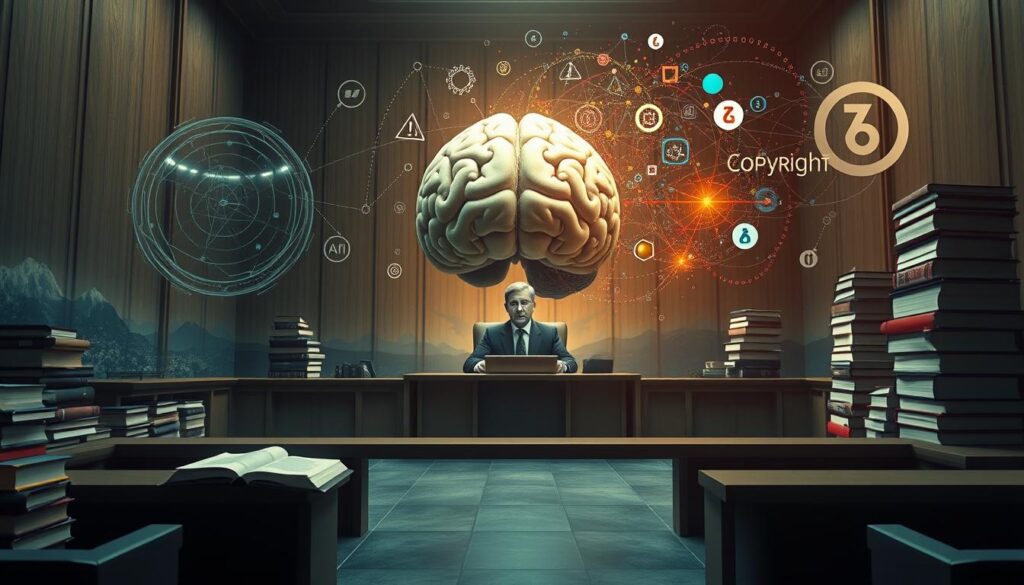
The integration of artificial intelligence into creative fields raises complex legal implications of AI writing, particularly concerning copyright law and originality. As the landscape evolves, it’s crucial to understand the current legal frameworks governing AI-generated works in the U.S.
Copyright law and originality
Copyright law in the United States specifically protects works that originate from human authors. This regulation has created challenges, particularly as applications for AI-generated content protection increase. According to the Copyright Office, works entirely generated by AI cannot be copyrighted, while those where AI merely assists in the creative process may still be eligible7.
Writers can use AI tools to enhance their creative process, but the unique creative elements must originate from the human author to qualify for copyright protection.
Due to these regulations, a critical distinction exists between AI-generated and AI-assisted content, highlighting that true originality remains a prerequisite for copyright eligibility8.
AI technology has significantly transformed the publishing industry, introducing new creative challenges for authors and necessitating adjustments to conventional copyright frameworks. The tightening of these frameworks emphasizes the need for human creativity in resolving the legal implications of AI writing, reflecting an ongoing dialogue within the industry
A notable case from 2018 saw the U.S. Copyright Office refuse to register copyright in a work generated entirely by AI, reaffirming that copyright law protects works authored by humans.
Current legal frameworks in the U.S.
The evolving legal landscape surrounding AI authorship laws aims to address recent developments in technology. Contract clauses are emerging that dictate how authors can use AI in their works, including prohibitions on using an author’s work to train AI and requirements for disclosing AI involvement in content creation6. As cases progress through courts, they will likely clarify how AI-generated content interacts with existing copyright laws and whether permission from copyright owners can be circumvented7. This anticipatory approach aims to safeguard both human authors and the creative integrity of published works, foregrounding the complexities introduced by AI innovations throughout the publishing sphere.
Ownership Rights of AI-Created Material
The debate on ownership rights of AI-generated content is complex and constantly evolving. As technology progresses, traditional views on authorship of AI works are being challenged. The U.S. Copyright Office does not currently protect creations made solely by AI, suggesting these works may enter the public domain immediately9. This lack of protection raises significant questions about the intellectual property rights for AI creations. It becomes even more complex when human involvement in the creative process is considered.
Who owns the rights to AI-generated content?
The question of ownership rights to AI-generated content depends on human involvement in the creative process. The Copyright Office states that works without sufficient human authorship, including those created entirely by AI, are generally not eligible for copyright protection10. However, users who add their creativity and input to AI-generated content have a better chance of securing ownership rights and avoiding copyright violations9.
The role of the developer versus the user
It’s crucial to understand the roles of developers and users in AI ownership. Developers create the AI tools, but users shape these tools to produce specific content. The Copyright Office emphasizes the importance of human authorship for copyright claims, making the ownership rights of AI-generated content complex10. As the legal landscape evolves, it’s essential for users to be aware of the intellectual property implications of using AI for creation.
The Impact of AI on Traditional Publishing
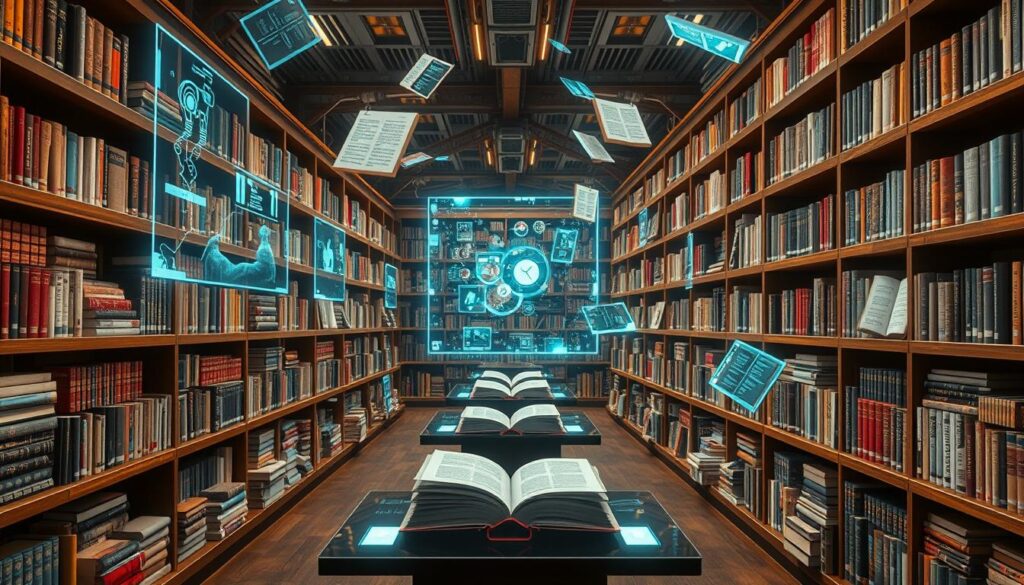
The traditional publishing world is changing fast, thanks to AI. Publishers see AI-authored books as a way to work smarter and offer more content. With tools like ChatGPT, they can create content quickly and accurately, matching human writing styles up to 99%11. This means they can produce a lot of content fast, keeping the tone and style consistent11.
How publishers view AI-generated books
Publishers are exploring how to use AI in their work, trying to meet reader needs better. AI’s fast growth and cost savings are making them rethink how books are made12. They see AI as a way to scale up their publishing, adjusting their strategies to include AI-generated books.
Reactions from authors and literary communities
Authors and writers have mixed feelings about AI books. Some worry about originality, fearing AI could flood the market and lessen the value of personal stories11. Yet, others see AI as a tool to improve storytelling and open up new creative paths12.
AI’s arrival brings up big questions about quality and ethics in content creation. Authors must weigh the role of AI in their work, sparking debates about AI’s place in literature13. As the field evolves, publishers and writers face the challenges AI brings111312.
Ethical Considerations of AI-Generated Books
The rapid integration of artificial intelligence into creative writing has brought forth critical ethical concerns. The risk of plagiarism in AI-generated content is substantial, given its reliance on vast datasets. This could inadvertently lead to issues of originality. Authors must ensure their use of AI does not violate existing copyrights, preserving the integrity of the writing profession.
Plagiarism concerns in AI writing
Debates on plagiarism in AI writing have intensified among authors and legal professionals. AI’s ability to generate text in minutes raises concerns about unintentional copying of existing works. This speed necessitates the development of effective plagiarism detection tools14. A survey showed a significant number of writers feel the need to use technology responsibly, highlighting the importance of maintaining originality and proper acknowledgment in literary works12.
Ethical use of AI in creative processes
The ethical application of AI in writing demands transparency and respect for intellectual property. AI can assist by suggesting edits and even writing chapters, but authors must acknowledge the source of ideas and adhere to copyright laws. Tools like Grammarly and ProWritingAid can improve editing, yet authors should not let these tools replace their creative efforts14. As AI progresses, the potential for generating unique cover art through generative AI is promising. However, it requires careful consideration of ownership rights and ethical implications12.
Licensing Issues in AI Content Creation
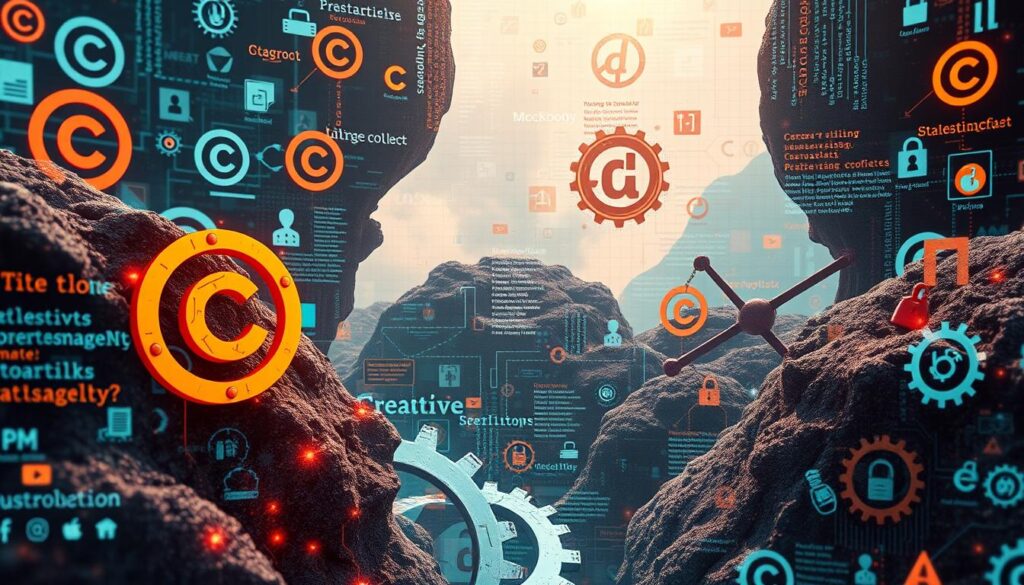
Authors entering the AI content creation field must grasp licensing issues. AI’s growing role in creative fields, like book publishing, demands a clear understanding of types of licenses applicable to AI works. The right license can affect ownership and creative freedom.
Types of licenses applicable to AI works
AI content generation is governed by various licenses. These range from open-source, allowing for modification and distribution, to proprietary, with strict usage rules. It’s crucial for creators to know that copyright law protects human-created works, not AI-generated ones8. This fact underscores the need to understand the terms of AI tool licenses.
The implications of using licensed AI tools
Using licensed AI tools can shape an author’s publishing options. For instance, over 250 authors and publishers use AI, but ethical standards are paramount15. The Authors Guild offers guidelines on AI use, emphasizing ethics, originality, and transparency15. The debate on AI-generated work copyright eligibility continues, showing the need for AI tools licensing knowledge.
Case Studies of AI in Publishing
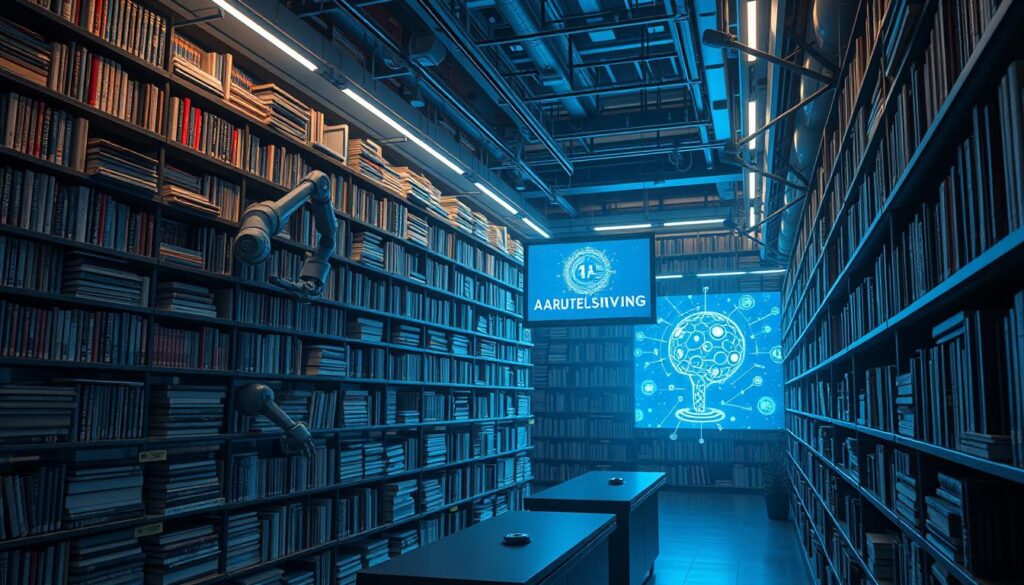
The publishing industry is rapidly evolving with AI’s influence. Case studies of AI in publishing reveal both triumphs and legal hurdles. These examples highlight AI’s role in creating market-ready content and the need to resolve legal issues it brings.
Successful AI-authored books
Recent years have seen the rise of successful AI-authored books, captivating readers and critics alike. These books showcase AI’s ability to craft engaging stories. An AI-generated novel, for example, has shown that AI can create content that resonates with readers, achieving significant sales and acclaim. This success fuels growing interest in AI’s role in literature.
Legal disputes over AI-generated content
The advent of AI in publishing has introduced legal complexities. Legal battles over AI-generated content are intensifying, as copyright laws lag behind technological progress. Getty Images has sued Stability AI for allegedly using over 12 million images without permission, claiming they were altered to infringe copyrights16. Moreover, visual artists have joined class actions against AI companies, accusing them of using their work to train models without consent16. These disputes highlight the challenges creators face in safeguarding their intellectual property in an AI-driven world.
Legal perspectives are shifting, with courts ruling that AI-generated content lacks copyright protection, affirming human creations’ exclusive rights17. Transparency about AI’s role in content creation may help mitigate these disputes. It could aid creators in defending their rights while navigating the complexities of copyright claims.
Future of AI in Literature

The evolution of AI technology is transforming the literary landscape. Predictions suggest AI tools will become essential in the writing process. AI chatbots now enable authors to create text much faster, changing how stories are told. This rapid content generation opens up new creative avenues but also highlights the need for legal reforms on AI authorship.
Predictions for AI’s role in publishing
The future of AI in literature is bright, promising to enhance both efficiency and quality. Tools like Grammarly and ProWritingAid already aid authors in refining their work. ChatGPT and others will allow writers to brainstorm and outline quickly, reducing writing timelines from years to weeks or days14. As the industry adopts these innovations, ethical use and rights protection will become crucial topics.
Potential legal reforms regarding AI authorship
Legal reforms are necessary to address the challenges posed by AI authorship. Current copyright laws are struggling to adapt to technological progress. The Copyright Office has ruled against registering works solely created by AI, insisting on human authorship for protection6. This could lead to reforms that clarify authorship rights, especially with the rise of AI-generated content. In extreme cases, AI companies might need permissions from copyright holders for model training18. Such updates could establish clear boundaries and permissions for AI in creative processes.
The Influence of AI on Reader Expectations

The advent of AI-written books has dramatically reshaped the literary world, leading to evolving reader expectations. As readers become more aware of AI’s role in storytelling, curiosity about its implications grows. This marks a transition from classic tales to a more tech-driven form of creative writing, sparking interest and participation.
How audiences perceive AI-written books
Today, readers look for a mix of innovation and creativity in AI-generated content. AI content tools, such as AIContentfy, have seen rapid growth, attracting over 100,000 monthly visitors in just ten months19. This surge shows how much audiences value AI’s efficiency and originality. Yet, ethical dilemmas about plagiarism and deception highlight the intricate relationship between AI authorship and audience trust19.
The effects on storytelling and narrative styles
AI’s influence on storytelling often deviates from traditional methods, showcasing technological progress and AI’s versatility in narrative reshaping. Research indicates AI can create novel content but may lack true originality20. This raises questions about the authenticity and creativity of the content readers consume. Furthermore, as AI tools become part of everyday writing, distinguishing between human and AI-generated content becomes increasingly challenging, prompting deeper analysis of their creative industry impact20.
AI Contributions to the Self-Publishing Boom
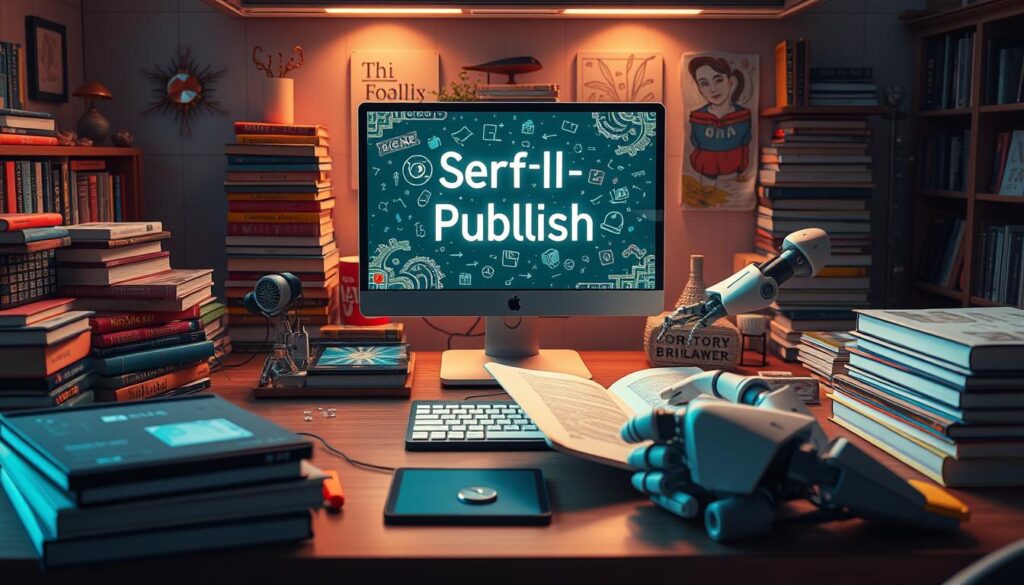
The advent of AI in self-publishing has revolutionized how authors create their works. AI-assisted self-publishing has made it easier for writers to produce content swiftly and effectively. This has led to a surge in diverse titles across genres, making the ebook and audiobook markets more crowded.
Growth of AI-assisted self-publishing
AI tools streamline production, enabling authors to quickly produce books based on trends and search terms. Some use keyword scrapers and AI to publish numerous books rapidly, speeding up the self-publishing process. The Authors Guild has highlighted a hidden ecosystem producing low-quality ebooks that spread misinformation or rehash existing knowledge21.
Case studies of successful self-published AI books
Many AI-assisted self-published books have achieved success, showcasing the technology’s potential. However, some books risk lowering market standards21. Amazon is continually improving the shopping and reading experience by exploring technologies like generative AI. This makes the self-publishing world both challenging and full of opportunities for authors.
While AI brings many benefits to self-publishing, quality control remains a pressing issue. The influx of low-quality ebooks can harm authors’ financial prospects, especially when selling at $0.99 on platforms like Kindle21. Reviews are crucial for visibility, with some authors using review swaps to influence algorithms and attract buyers. This aspect of the self-publishing boom raises both innovative and ethical questions, as authors aim to leverage AI advancements.
Cultural Reactions to AI in Literature
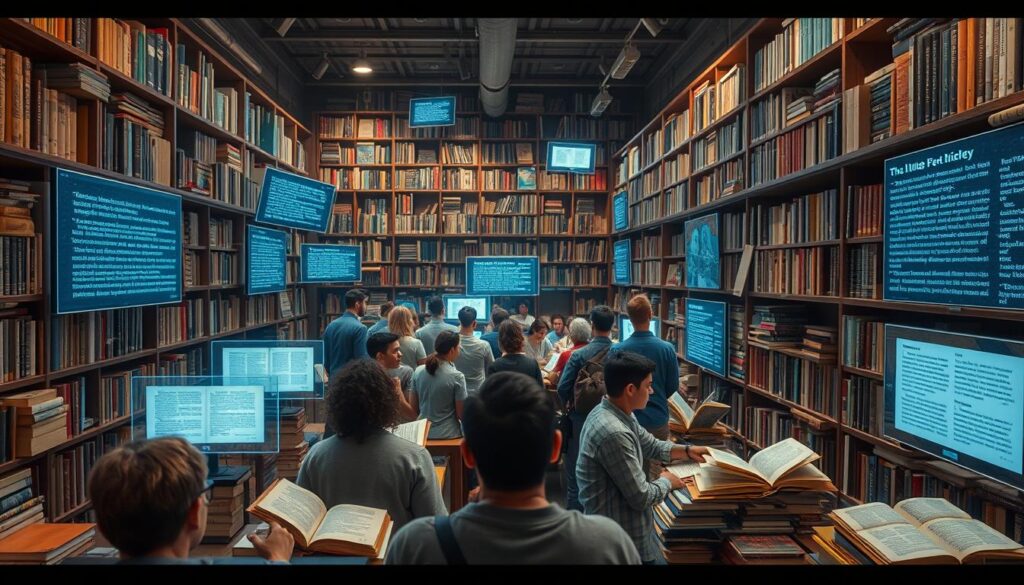
The cultural landscape surrounding AI in literature is complex, with differing views on artificial intelligence and authorship. Many see AI as a legitimate contributor to creative processes, while others doubt its ability to match human creativity. It’s suggested that authors use AI as a tool for brainstorming and refining ideas, not as the primary source of work22. Critics argue that true creativity involves unique human experiences, something AI lacks.
Public perception of AI authorship
Authors and audiences have varying levels of acceptance towards AI-generated content. Controversies have emerged, like lawsuits from famous authors like George R.R. Martin. They claim unauthorized use of their work for AI training is akin to identity theft23. This highlights concerns about AI’s impact on artistic integrity and the complexities of ownership in this new creative space.
Artistic value versus technological capability
The debate on artistic value in AI creations reveals a split within the literary community. Some believe AI can boost creative expression, while others think its reliance on existing works diminishes its originality. Publishers are exploring AI’s role in editorial and marketing, showing both excitement and caution about its influence on literature24. As AI technology evolves, the cultural conversation on creativity and authorship will continue to grow, raising important questions about the future of writing and its core values.
International Perspectives on AI and Copyright
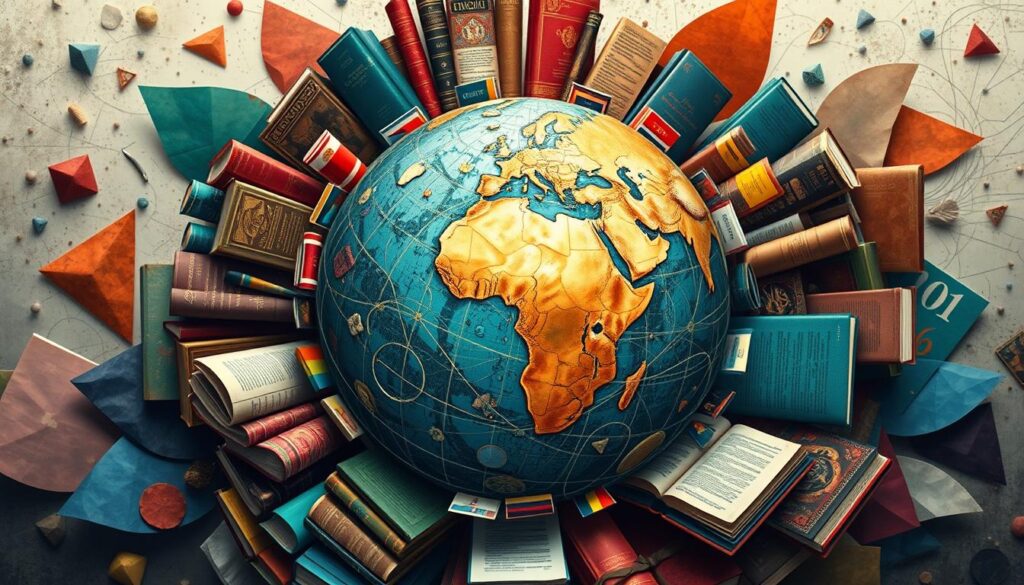
The landscape of international perspectives on AI and copyright reveals stark contrasts between U.S. laws on AI and those of other countries. Legal frameworks worldwide show varied views on AI authorship, with some nations adopting more lenient policies than the U.S. For example, while the U.S. Copyright Office has turned down copyright for several AI-generated works, citing the absence of human authorship, other countries are exploring more inclusive stances towards AI-generated content.
Comparison of U.S. laws with other countries
The U.S. Copyright Office has consistently denied copyright for works created solely by machines, as seen in the case of “Zarya of the Dawn” being canceled due to its AI-generated nature25. Conversely, the Beijing Internet Court has granted copyright for AI-generated pictures, emphasizing the importance of user intellectual input in demonstrating originality25. This highlights the ongoing debate over which jurisdiction might benefit from updated standards to accommodate AI’s evolving nature.
Global trends in AI authorship legislation
Copyright laws concerning AI are still in development globally. The Copyright Office’s recent decisions, like denying copyright for “SURYAST” due to lack of human creative control, reflect the strict U.S. framework25. The rapid advancement of AI technology has sparked increased discussions on the adequacy of legal protections. Reports show a rise in AI-generated works, complicating ownership rights26. As countries revise their copyright laws, finding a balance between innovation protection and human creativity is crucial.
Regulatory Bodies and AI Publishing

The rise of AI in publishing has led regulatory bodies to create guidelines and policies. In the U.S., the Copyright Office is key in shaping laws for AI-generated content. It ensures these innovations comply with copyright regulations. The Copyright Office role in AI involves managing the registration and distribution of AI-generated works. This affects authors and publishers greatly.
The role of the Copyright Office in the U.S.
The Copyright Office oversees the registration of works, including AI-created ones. Its interpretations can determine if AI texts get copyright protection. This impacts the rights of developers and users. The changing regulatory landscape has sparked interest among industry stakeholders.
Involvement of professional writers’ associations
Professional writers’ associations are now discussing AI’s impact on creative writing. They push for legislative and regulatory updates that reflect authors’ evolving needs. Their voices are vital in shaping policies for regulatory bodies in AI publishing. They aim to ensure fair practices in AI-generated content use.
Concerns over AI’s use of existing literary works for training are growing. Associations demand more transparency and respect for authors’ rights. Collaboration between regulatory bodies and writers’ associations is crucial. They must navigate the complex AI landscape in publishing272829.
AI as a Tool for Traditional Authors

AI has revolutionized the writing world, becoming a crucial tool for traditional authors. It fosters collaboration between humans and AI, blending human creativity with AI’s advanced capabilities. This synergy not only boosts creativity but also enhances writing efficiency with AI. As more writers embrace AI, their capacity to generate ideas, refine drafts, and craft plots grows exponentially.
Collaboration between humans and AI
The synergy between authors and AI systems like ChatGPT has ushered in a new era in creative writing. By working with AI, writers can explore a wide range of styles and genres, broadening their creative horizons. AI tools enable authors to delve into narrative structures previously unexplored in traditional writing. Industries like content marketing are now using AI detection tools to ensure originality and avoid plagiarism30.
Enhancements in writing efficiency and creativity
AI’s integration has significantly improved writing efficiency with AI for authors. Tasks like grammar checks, content organization, and basic research are now automated, freeing authors to concentrate on storytelling. This shift grants authors more creative freedom, as AI handles logistical challenges. Legal discussions around AI-generated content highlight the role of human input in creative work, affirming authors’ importance in the writing process despite AI’s rise31.
Conclusion: The Evolving Landscape of AI in Publishing
The integration of AI into publishing has brought forth a multitude of legal and ethical hurdles. Authors and industry professionals must tread carefully through issues like copyright protection and authorship rights. The landscape is further complicated by the decline of the rule of law in many countries, making AI’s role in publishing even more critical32. It’s imperative to foster a dialogue that encompasses both legal and moral aspects of the rule of law. This is especially true given the diverse interpretations of its definition32.
The future for authors is both complex and transformative. Litigation over AI copyright issues involves major players, highlighting the need for alternative solutions. Options like universal basic income and new taxation structures are being explored33. Moreover, the legal field is facing a challenge as top U.S. firms increasingly use generative AI. This creates a tension between the logic of algorithms and the critical insights of human lawyers34.
In conclusion, the future of AI in publishing is marked by a need for ethical considerations. Issues like attribution and consent are at the forefront33. As the industry navigates these challenges, ongoing dialogue is essential. It must adapt to ensure a sustainable and equitable future for authors and publishers alike.
FAQ
Is it illegal to publish a book written by AI?
What constitutes AI-generated content?
What is the historical context of AI in literature?
How does copyright law relate to AI-generated works?
What are the current legal frameworks in the U.S. regarding AI authorship?
Who owns the rights to AI-generated content?
What is the role of the developer versus the user in AI-created materials?
How do publishers view AI-generated books?
What are the reactions from authors and literary communities about AI-created literature?
What are the plagiarism concerns in AI writing?
What is the ethical use of AI in creative processes?
What types of licenses are applicable to AI works?
What are some examples of successful AI-authored books?
What legal disputes are emerging over AI-generated content?
What predictions exist for AI’s role in publishing?
How do audiences perceive AI-written books?
What effects does AI have on storytelling and narrative styles?
What is the growth of AI-assisted self-publishing?
What are the case studies of successful self-published AI books?
What is the public perception of AI authorship?
How does artistic value compare to technological capability in AI creations?
How do U.S. laws compare with those of other countries regarding AI and copyright?
What is the role of regulatory bodies like the U.S. Copyright Office in AI publishing?
How are professional writers’ associations involved in AI publishing?
How does AI function as a tool for traditional authors?
Source Links
- Question: Is It Legal to Use AI to Write a Book? | Is That Legal?
- Can You Use AI Content Legally?
- Can You Legally Use ChatGPT to Write a Book
- AI and Copyright Law: What We Know | Built In
- AI for Authors: Ethical & Practical Guidelines
- Artificial Intelligence and Publishing Law
- Everything a Writer Needs to Know About AI and Copyrights
- Legal Issues with AI-Generated Content: Copyright and ChatGPT | Article | Chambers and Partners
- Who Owns the Rights to Content Created by Artificial Intelligence Generators?
- AI and Copyright Law in 2023: Federal Government Activities
- Mastering The Art Of AI Ghost Writing: Navigating Legality, Compensation, And Credit – Brain Pod AI
- What now? The Legal and Ethical Use of AI in Book Cover Design | DAMONZA
- Copyright and ChatGPT: Who owns AI-generated content?
- Using AI to Write a Book: Guide to Self-Publishing eBooks
- Copyright Protection In the Age of AI
- Current AI Copyright Cases – Part 1
- Disclosure of AI and Protection of Copyright – Trust Insights Marketing Analytics Consulting
- Is generative AI legal? Is it ethical? And can you copyright AI text or images? – MetaStellar
- The Ethics of Using AI Content Tools in Writing
- Ethics and the use of generative AI in professional editing – AI and Ethics
- Amazon is filled with garbage ebooks. Here’s how they get made.
- AI Best Practices for Authors – The Authors Guild
- Bookpocalypse: AI and the Risks to Literature and Free Expression
- Training Generative AI Models on Copyrighted Works Is Fair Use — Association of Research Libraries
- Does Copyright Protection Extend Beyond Original Works in an AI World? – New York State Bar Association
- New US copyright rules protect only AI art with ‘human authorship’
- ‘The potential to undermine democracy’: European publishing trade bodies call for action on generative AI
- Practical Tips for Authors to Protect Their Works from AI Use – The Authors Guild
- Will AI Replace Writers? It Already Is.
- Is Using AI Tools the Same as Plagiarizing? A Legal Perspective – Originality.AI
- Does Copyright Protection Extend Beyond Original Works in an AI World? – New York State Bar Association
- Preserving the rule of law in the era of artificial intelligence (AI) – Artificial Intelligence and Law
- ARTificial: Why Copyright Is Not the Right Policy Tool to Deal with Generative AI
- Tracking Generative AI: How Evolving AI Models Are Impacting Legal







